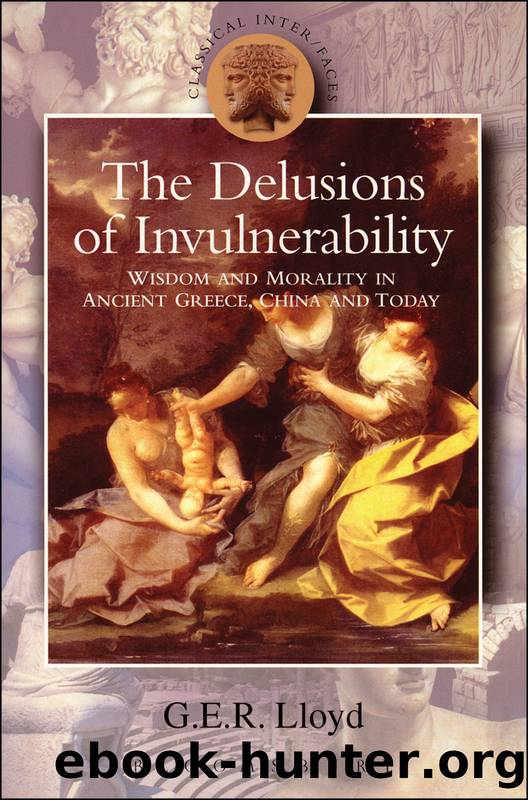Delusions of Invulnerability by G.E.R. Lloyd;

Author:G.E.R. Lloyd;
Language: eng
Format: epub
Publisher: Bloomsbury UK
Published: 2005-12-15T00:00:00+00:00
The question that I now wish to raise is the following. How far are the ideas and beliefs we have sketched out distinctive of ancient Greek preoccupations, and how far do they reflect concerns that can be paralleled elsewhere? What can a cross-cultural study of the modalities of the expressions of human vulnerability â and of how to respond to it â tell us about the values of the cultures or societies in question, and what light does that throw on the situation in which we find ourselves today? My next case-study is ancient Chinese thought, where I shall concentrate, as usual, on the period down to the end of the Han, that is say before Buddhism became a major influence. Even in the ancient period the Chinese materials we can consider are as diverse as those we have surveyed for ancient Greece.
At first sight many Chinese intuitions of human vulnerability, and many responses to it, appear similar to those we have discussed from pagan Greek antiquity. The cycles of good and bad fortune, and the idea that prosperity does not endure, are common Chinese motifs in poetry and in prose. Many exemplary tales in such texts as Zhanguoce and Huainanzi follow the sequence of apparent success, leading to self-indulgence and arrogance, leading in turn to disaster. In some, though not all cases, the root causes of human downfall are traced to the faults of the proud themselves.8 It is a common theme in early Chinese medicine that diseases often come from the excesses of self-indulgence.9
As for securing invulnerability, two Chinese themes again at first sight seem broadly similar to Greek ones. Immortality provided one great source of hope: elaborate practices of self-cultivation were developed to achieve it and much effort expended by, and on behalf of, Emperors and others, to obtain drugs and elixirs that could produce the desired result. Secondly, Chinese philosophy, like Greek, offers consolation. The sageâs virtue, we are told in the Lunyu, is a protection against disappointment, for example at being spurned and not given a chance to show how good government is to be achieved and the welfare of âall under heavenâ secured.10
But in each case there are revealing differences that reflect different values to which we must pay attention. The first question concerning immortality arises precisely in relation to what mode of âimmortalityâ was the goal. Self-cultivation and the taking of drugs might be thought to offer rather different routes to different ends, and certainly self-cultivation took many different forms. Yet they were combined, in Chinese âalchemyâ, as Sivin (1968) especially has shown, in a bid to promote longevity. The hope there was to secure not a blissful existence of a disembodied soul or pure reason, but rather the continuation of physical life, the only kind the Chinese prized, to imitate the supernatural beings called the immortals (ixian) in being indifferent to age.
There is no classical Chinese parallel to the stark dualism of Platonic psychology, where soul and body are of different ontological status, the one incorporeal, the other not.
Download
This site does not store any files on its server. We only index and link to content provided by other sites. Please contact the content providers to delete copyright contents if any and email us, we'll remove relevant links or contents immediately.
The remains of the day by Kazuo Ishiguro(8338)
Tools of Titans by Timothy Ferriss(7737)
Giovanni's Room by James Baldwin(6749)
The Black Swan by Nassim Nicholas Taleb(6720)
Inner Engineering: A Yogi's Guide to Joy by Sadhguru(6405)
The Way of Zen by Alan W. Watts(6254)
Asking the Right Questions: A Guide to Critical Thinking by M. Neil Browne & Stuart M. Keeley(5320)
The Power of Now: A Guide to Spiritual Enlightenment by Eckhart Tolle(5291)
The Six Wives Of Henry VIII (WOMEN IN HISTORY) by Fraser Antonia(5197)
Astrophysics for People in a Hurry by Neil DeGrasse Tyson(4973)
12 Rules for Life by Jordan B. Peterson(4138)
Housekeeping by Marilynne Robinson(4016)
The Ethical Slut by Janet W. Hardy(4008)
Skin in the Game by Nassim Nicholas Taleb(3941)
Double Down (Diary of a Wimpy Kid Book 11) by Jeff Kinney(3874)
Ikigai by Héctor García & Francesc Miralles(3830)
The Art of Happiness by The Dalai Lama(3817)
Skin in the Game: Hidden Asymmetries in Daily Life by Nassim Nicholas Taleb(3695)
Walking by Henry David Thoreau(3658)
